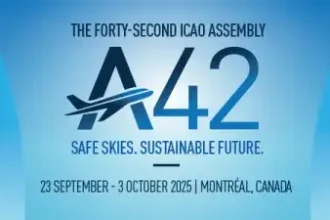The 42nd ICAO General Assembly was held in Montréal, Canada, from 23 September to 3 October 2025, with IFATCA once again an enthusiastic and active participant. As the sovereign body of ICAO, the Assembly, convened every three years, reviews and sets policy for ICAO’s work programme across the technical, administrative, executive, legal, and economic fields. Of these, the technical discussions are of greatest relevance to air traffic controllers, offering IFATCA an important opportunity to contribute to the global discourse on issues directly affecting the profession.
The IFATCA delegation was led by David Perks (Liaison Officer to the ICAO Air Navigation Commission) and included Jean-François Lepage (Deputy President), Tom McRobert (Executive Vice-President, Finance), and Andrew LeBovidge (Executive Vice-President, Americas). The delegation reviewed more than 700 working papers, formally co-sponsoring or supporting thirteen of them. Among these were papers on Fatigue Management (WP/258), Positive Safety Culture (WP/259), GNSS Radio Frequency Interference (WP/335), and Peer Support Programmes (WP/334).
In addition to co-sponsoring and supporting papers, the IFATCA delegation made a number of interventions(ICAO’s term for formal comments) on topics directly relevant to air traffic controllers. In WP/341, the Civil Air Navigation Services Organisation (CANSO) presented a concept of operations for a Complete Air Traffic Control System (CATS). IFATCA welcomed the opportunity to collaborate with all aviation stakeholders and acknowledged CANSO’s significant effort. However, IFATCA’s intervention reminded the Assembly that at the heart of any vision for the future must remain the human element, technology should enhance controllers’ capabilities, not replace them.
IFATCA also intervened to support WP/87 from the United Arab Emirates, which advocated modernising fatigue management systems in air traffic control. IFATCA encouraged ICAO to draw on expert groups to develop harmonised Standards and Recommended Practices (SARPs) and urged States to implement robust fatigue management systems.
There were further interventions on WP/167, expressing support for peer support programmes while emphasising the need for safeguards to protect the confidentiality of privileged information, and WP/417, which urged caution regarding the use of standardised aptitude and personality testing in ATC selection processes.
Several key themes from the Assembly will influence the work of air traffic controllers worldwide. First, the Assembly supported ICAO’s push for a global air traffic management (ATM) architecture, highlighting the importance of a harmonised and interoperable system. It also recognised the need for a data-driven, service-oriented architecture that enables flexible, scalable ATM services through digital integration, facilitating more efficient cross-regional airspace optimisation.
Second, it was encouraging to see that despite the rise of advanced automation and artificial intelligence, the Assembly reaffirmed a human-centred vision for ATM. This was reflected in the strong emphasis on fatigue management, safety culture, peer support, and integrating human performance into technological advancement. Collectively, these priorities ensure that modernisation strengthens the central role of air traffic controllers in global aviation safety, rather than diminishing it.
Finally, the Assembly acknowledged several pressing challenges for States and air navigation service providers (ANSPs) that directly affect air traffic controllers, including global ATCO shortages, the lack of standardised licensing between States and regions, and the ongoing issue of GNSS radio frequency interference.
IFATCA continues its long-standing tradition of active participation in global aviation forums, with the triennial ICAO Assembly remaining the most significant. Once again, IFATCA’s representatives collaborated constructively with delegations from Member States and other international organisations to ensure that the interests and professional perspectives of air traffic controllers remained at the forefront of deliberations and were reflected in the Assembly’s outcomes.
Tags: ICAO Montréal, Canada, IFATCA
